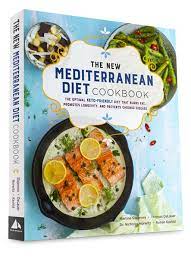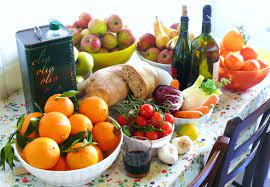 About thirty years ago, my mother gave my then-new bride and me what has become over the years one of our most use-worn cookbooks: The Mediterranean Diet Cookbook. Being someone at the time who enjoyed eating whatever I wanted, a cookbook with the word “diet” in it would not normally have grabbed my attention.
About thirty years ago, my mother gave my then-new bride and me what has become over the years one of our most use-worn cookbooks: The Mediterranean Diet Cookbook. Being someone at the time who enjoyed eating whatever I wanted, a cookbook with the word “diet” in it would not normally have grabbed my attention.
But, fortunately, my wife is smarter than me, and I love olive oil, garlic, tasty spices, and fish, so these were — and are — recipes that have never felt like diet food. Throw in a little red wine, and you’ve got a regular celebration.
The idea is that when we eat foods that feature a variety of multicolored, nutrient-rich vegetables, low in saturated fats, with an emphasis on more omega-3 fatty acids (found in deep water ocean fish like salmon), our hearts and the rest of our bodies can be much healthier over time.
But this story is becoming much more interesting…
It looks like the foods we eat may have a lot to do with our psychological and emotional health as well.
In almost every area of life, things have improved incredibly over the past five or six decades. Our health and longevity are better; pollution is lower; violence has declined; our abstract reasoning ability has grown… and technologically we have come to accept tools like laptops and smart phones that were pure science fiction a half century ago.
But there is one serious affliction that has grown by about five-fold over that same period of time: depression.
There are certainly many reasons for this. Martin Seligman has shown that depression is often a symptom of helplessness. We’re more sedentary nowadays, which can exacerbate a sense of the inability to act.
We also are more aware of the worst of what’s happening among all seven billion of us, piped directly into our limbic systems via modern media, so if we watch the news at all, we can feel that the world is going to hell in a handbasket, and that we’re helpless to do much about it… when the truth is mostly the opposite.
But now we’re beginning to see a more interesting pattern regarding health and happiness – or their absence. Just as we’re discovering with heart disease and certain brain disorders, it looks as though much of depression may have its roots in a physical process: inflammation.
What we eat has an even more direct and profound impact on this process of inflammation.
 More specifically, a diet full of vegetables may be one route, not only to better physical health, but to better mental health as well.
More specifically, a diet full of vegetables may be one route, not only to better physical health, but to better mental health as well.
Research is showing that our happiness and mental health rise with the number of daily portions of fruit (berries are best) and vegetables we eat, peaking at about seven helpings; it boosts mood at least as well as taking an antidepressant.
Seven helpings of fruits and vegetables a day significantly improves the mood and mental health of young adults around the age of nineteen, while those eating the least healthy foods increase their risk of depression by 79%.
A Mediterranean Diet centers around vegetables, fruits, nuts, cereals, legumes and fish. It significantly reduces our risk of depression, and it cuts our risk of developing Alzheimer’s in half.
Then there’s the role of omega-3 fatty acids. We can get this in fish and flax seed oil, as well as in meat, poultry and eggs that are grass fed. We can also take omega-3 fish oil supplements with good effect.
Omega-3’s counteract inflammation. They reduce our risk of depression, and reduce cognitive decline. They also lower aggression in normal and prison populations, and may reduce aggression and ADHD in children.
Eating less fish is associated with higher levels of depression and anxiety, and worsens symptoms with affective and schizophrenic disorders – consistent with inflammation playing a role in these. In contrast, higher levels of omega-3’s may help control bipolar disorder, and prevent progression to firstepisode psychosis in high risk youth.
 This is a big deal. Schizophrenia and bipolar disorders have been some of the most difficult psychological troubles to deal with. Medication can help but it also can have nasty side effects, and therapy requires challenging and heroic work for the sufferer. This isn’t anything like a cure, but to have something simple that can improve things even a little bit can offer hope that’s been sorely lacking.
This is a big deal. Schizophrenia and bipolar disorders have been some of the most difficult psychological troubles to deal with. Medication can help but it also can have nasty side effects, and therapy requires challenging and heroic work for the sufferer. This isn’t anything like a cure, but to have something simple that can improve things even a little bit can offer hope that’s been sorely lacking.
Our brains consume about 420 calories a day. They need omega-3 fatty acids, folate, fiber, choline, iron, zinc, and vitamins B12, E and D among other nutrients. Vitamin D is actually a hormone with antioxidant and anti-inflammatory properties, and it also benefits our nerve function.
Then there are our friends the bacteria…
There are more bacteria cells in our bodies than the cells of our bodies themselves – they’re much smaller, so they take up a lot less space. But we’re finding more and more the importance of the friendly bacteria in our guts.
The vegetables we’ve already talked about are prebiotics; these are what the helpful bacteria in our systems need to flourish.
After we eat prebiotics, we have significantly lower levels of cortisol when we wake up in the morning – high cortisol is linked to stress, anxiety and depression. We also pay less attention to negative information and more attention to positive information, so we have less anxiety about negative or threatening things.
That could be a problem if we lived in the kind of very dangerous environment that our more distant ancestors did. But for most of us, most of the time, our troubles come from over-reacting to things that look negative or threatening, but actually are not.
Probiotics are the friendly bacteria themselves. We can get these through eating things like yogurt, sauerkraut, and miso soup. Probiotics are connected to how we process information related to anxiety and depression, and they influence the stress response. There have been cases of deep, intractable depression being lifted through eating probiotics. This isn’t a common occurrence, but it does show how severe the absence of these friendly bacteria can be.
In my office I have shelves full of books on psychology. I could never have guessed thirty years ago that a cookbook would compete with them in importance. But with all the research coming out on lifestyle, happiness, and psychological health, it may be that what’s in our refrigerator is as important as what’s going on in our heads.
 Joel F. Wade, Ph.D., is the author of The Virtue of Happiness, Mastering Happiness, and The Mastering Happiness Podcast. He is a marriage and family therapist and life coach who works with people around the world via phone and Skype. You can get a FREE Learning Optimism E-Course if you sign up at his website, www.drjoelwade.com. Dr. Wade will be speaking at FreedomFest, “the world’s largest gathering of free minds,” at the Rushmore Plaza Civic Center in Rapid City, South Dakota July 21-24.
Joel F. Wade, Ph.D., is the author of The Virtue of Happiness, Mastering Happiness, and The Mastering Happiness Podcast. He is a marriage and family therapist and life coach who works with people around the world via phone and Skype. You can get a FREE Learning Optimism E-Course if you sign up at his website, www.drjoelwade.com. Dr. Wade will be speaking at FreedomFest, “the world’s largest gathering of free minds,” at the Rushmore Plaza Civic Center in Rapid City, South Dakota July 21-24.
Copyright 2021, Joel F. Wade

